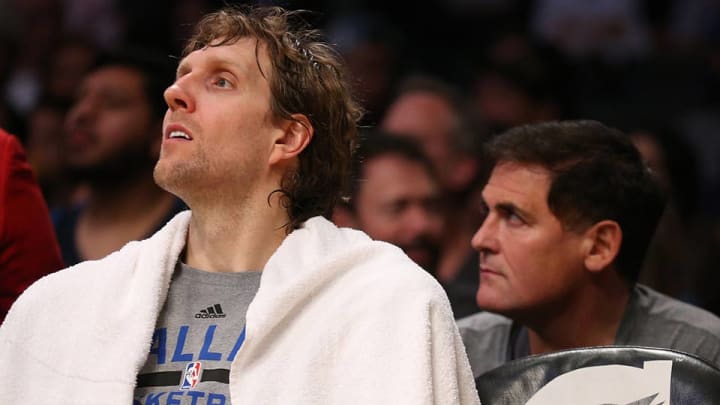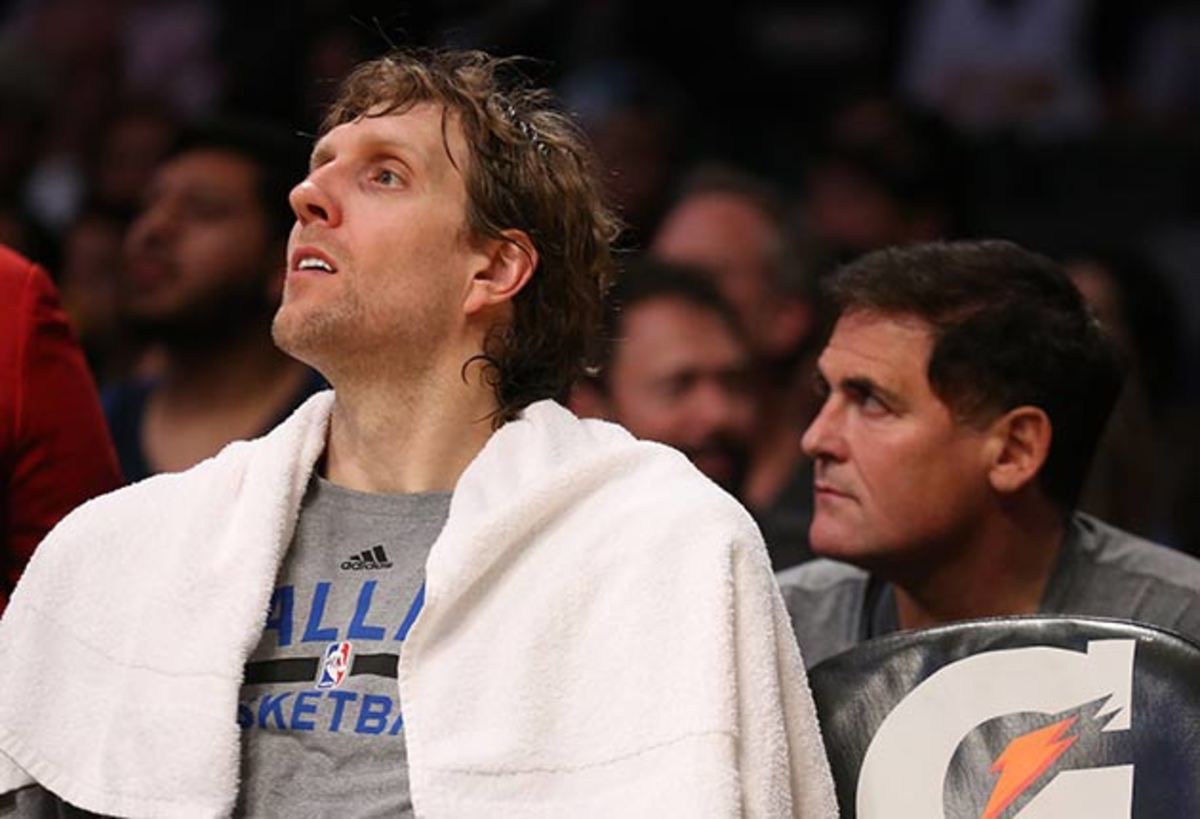With superstars failing to align again, Mavs reconsider rebuilding approach

Your teams. Your favorite writers. Wherever you want them. Personalize SI with our new App. Install on iOS or Android.
The Dallas Mavericks have spun their wheels for five straight seasons. Every summer they seem to approach free agency with the same top-down order of operations, even at the risk of alienating those free agents who would have liked to stay in Dallas. Their thinking on this point is understandable: land just one high-impact player and contributors like Tyson Chandler and Chandler Parsons become a moot point. Pair Dirk Nowitzki with a star and the rest will fall into place.
It's an approach that, for all its explicable virtues, feels somewhat dated. Dallas runs a smart operation with rational priorities. Yet in the course of executing their off–season plans, the Mavs have remained persistently non-committal—even at a time where the biggest signings are made by teams with more concrete intentions. Everything that Dallas sells to free agents is contingent on something else. Max–market players like Mike Conley and Hassan Whiteside, for example, are pitched on joining the Mavs together, part of the appeal generated by factors external and conditional. It’s a bold course befitting the style of owner Mark Cuban.
Threading the needle between the priorities of two highly coveted players is never easy. Dallas, though, has crafted its entire big-picture strategy around the premise of clearing enough cap space to do just that. Their commitment to flexibility is admirable to a fault; any financial circumstances that would allow contenders like the Spurs and Warriors to add top-tier free agents marginalizes what space-driven teams like the Mavs can really offer. So much was invested in having the logistical means to add talent that Dallas came up short in its attempt to persuade available stars.
• Grades: Mavericks reward Nowitzki's loyalty with two–year, $40M deal
To clear the deck every summer for the sake of cap room is, in the most literal sense, to trade in nothingness. Stars today can find teams that offer more.

This is where DeAndre Jordan doubling back on his commitment stings the most. It would have undoubtedly helped the Mavs to have a rebounder, finisher, and defender like Jordan on the roster last season. It would have helped even more to have a 27-year-old All-NBA center act as an ambassador for the franchise while it looks to improve. His very presence would have been a recruitment tool; rather than try to bridge the interests of two free agents being pulled in different directions, Dallas would be able to sell a clearer vision with a group in place. How might the free agency of Conley, Parsons, or even Kevin Durant gone differently had Jordan been a Maverick?
Even though Jordan isn't a superstar, his signing would have changed everything. The calculus of team construction would be entirely different were Nowitzki still in his prime. As it stands, he (and head coach Rick Carlisle, whom players respect a great deal) needs more tangible help to bring other top talent to the Mavs. Jordan could have filled that void. Instead, Dallas is now in the swing of a familiar, consolatory sequence. No team in the league does better in piecing together a patchwork roster after its initial free agent plans fell through. None is quite so practiced, either.
• 2016 NBA free agency: Grading the biggest deals of the summer
Those desperate actions show the Mavs' front office at its best—well-versed in player personnel, financially creative, and mindful of even small changes in the marketplace. That Dallas has remained competitive (and qualified for the playoffs in four of the past five years) is a testament to their ability to navigate contingencies. Andrew Bogut will become the Mavs' next starting center at only the cost of a second-round pick, much like Zaza Pachulia before him. Harrison Barnes will be signed to a max contract with room to grow, not unlike Parsons. Deron Williams returns on a one-year deal as the best option from a dry point guard pool. For upward mobility, Dallas has made a $37 million wager (over four years) that Dwight Powell's jumper might improve and an investment in the recent, relative success of Seth Curry.
In lieu of spending to the limit, an effort was made to give back to Nowitzki some of what he sacrificed on previous deals. Two years at $40 million probably still falls short of Dirk’s market value and definitely falls short of all the money he left on the table. But it’s a telling gesture from a team that couldn’t field a plausible contender when Nowitzki agreed to a fraction of what he could have made on his previous contract. Without titles hopes, returning Nowitzki’s salary to this more reasonable level is fair business.
• KD to the Warriors: Is this the most fascinating move in NBA history?
Still the cycle continues, though this time the Mavs have intentionally gravitated toward 24- and 25-year-olds as they scramble to give Nowitzki the respectable team he deserves. It's a meaningful change of pace for a franchise that has systematically prioritized veterans. The cupboards in Dallas have laid bare for a reason; Carlisle's teams lean toward more experienced players and a franchise habit of moving down or out of the draft has shorted what should be a richer pipeline. This is the closest that this iteration of the Mavericks—which is still dedicated to giving Nowitzki a graceful exit to his career—will get to a rebuild.
With that comes even greater uncertainty than the fly-by-the-seat-of-their-pants Mavs are accustomed to. These aren't proven veterans in need of a change in scenery. Barnes, for example, played a limited role in Golden State because he couldn't offer much beyond it. Now he will be paid (and, it seems, empowered) in a manner completely incommensurate with the player he was last season. Growth is not beyond him. Yet Barnes will need to make real, significant progress in his work with the Mavs' developmental staff to justify his signing.
This is the kind of player who will determine Dallas's immediate future. Barnes doesn't need to be an All-Star. Neither do Powell, Curry, or rising sophomore Justin Anderson, along with any other prospects the Mavs might add before the start of the season. The hope is that some among them might move toward the kind of dependable play that a team can work into its structure without much worry. Any dreams of adding a star alongside Nowitzki have again been deferred. What matters now is the halting of a tired, five-year pattern, bit by uncertain bit.
